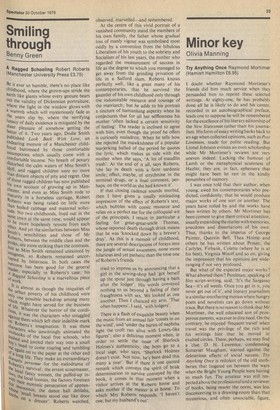Smiling through
Benny Green
A, Ragged Schooling Robert Roberts (Manchester University Press £3.75) Be it ever so humble, there's no place like Childhood, where the grown-ups stride the earth like giants whose every gesture bears out the validity of Dickensian portraiture, Where the light in the window glows with a warmth which will mysteriously fade as the years slip by, where the terrifying lunacy of daily existence is mitigated by the Sheer pleasure of somehow getting the better of it. Two years ago, Dodie Smith Published Look Back With Love, an endearing memoir of a Manchester childhood buttressed by those comfortable assumptions which usually come with a comfortable Income. No breath of penury disturbed the calm waters of Miss Smith's idYll, and ragged children were no more than distant objects of pity and regret. One of those ragged children has now published
own account of growing up in Man
cuester, and even as Miss Smith rode to maturity in a horseless carriage, Robert Roberts was being raised on little more than boiled cabbage and maternal solicitude. No two childhoods, lived out in the s,arne town at the same time, would appear io be more hopelessly remote from each (,)ther. And yet the similarities between Miss "E'n-lith's sensibilities and those of Mr r,°11e, rts, between the middle class and the ;roles, are more striking than the contrasts. as Miss Smith remained untainted by 'rulugness, so Roberts remained uncorP 01,,ed by bitterness. In both cases the it tj'e°rne has been good for the general alder, especially in Roberts's case; his ggged work. Schooling is a marvellous piece It is almost as though the iniquities of oie, urban poverty of his childhood were \v"illY one possible backdrop among many or lic.,11 might have served for the business tionue. Whatever the horror of the condi it was the characters who struggled 44inst them which left their indelible mark eharlkoberts's imagination. It was those tek,,cters who unwittingly animated the :huooks of the local free schools, who boy,ed and jostled their way into a small nut ,_ s bead to come roaring and tumbling of algain on to the paper at the other end cira,,i(ffig life. They make an extraordinary R•obeatis personae for the melodrama of the lorets:is ,survival: the errant scoutmaster, laws, t,'" Laney women, the puffed-up inwith the' local loonies, the factory foremen tice . ir moronic persecution of appren ‘ InRoce ,-cose ,„ nee, the dance hall delilahs, Knobs 'nlall breasts stood out like door °11' a dresser'. Roberts watched,
observed, marvelled—and remembered.
At the centre of this vivid portrait of a vanished community stand the members of his own family, the father whose gradual loss of manly vigour was symbolised most oddly by a conversion from the bibulous Liberalism of his youth to the sobriety and Socialism of his last years, the mother who regarded the measurement of success in life as the degree to which you managed to get away from the grinding privation of life in a Salford slum. Roberts knows perfectly well, like a great many of his contemporaries, that he survived the gauntlet of his own childhood only through the indomitable resource and courage of the matriarch; but he adds to his portrait a tincture of humanising asperity when he conjectures that for all her selflessness his mother 'often lacked a certain sensitivity of feeling'. The reader is inclined to agree with him, even though the proof he offers is curiously maladroit. When he tells how she rejected the mawkishness of a popular tearjerking ballad of the period he quotes the lyric, which makes us side with the mother when she says, 'A lot of maudlin trash'. At the end of it all, says Roberts, 'she lay in death with a faint sardonic smile; effect, maybe, of strychnine in the terminal drugs, or a final comment, perhaps, on the world as she had known it'.
If that closing cadence sounds morbid, then I have given a totally misleading impression of the effect of Roberts's text, which bubbles with comic resource and relies on a perfect ear for the colloquial wit of the principals. I retain in particular a feeling for great-great-uncle Thomas, whose reported death through drink means that he was 'knocked down by a brewer's dray'. As this is a memoir of childhood, there are several descriptions of forays into the jungle of sexual awareness, none more hilarious and yet pathetic than the time one of Roberts's friends tried to impress us by announcing that a girl in the sewing-shop had 'got herself up the spout just through having a bath after the lodger'. His words conveyed nothing to us beyond a feeling of their fraughtness with sex. We looked at one another. Then I chanced my arm. 'That often happens', I said, 'with lodgers'.
There is a flash of exquisite beauty when the music from an annual fair `comes in on the wind', and 'under the bursts of naphtha light the croft ran alive with Lowry-like figures'; also a delicious moment when, in order to settle the issue of Sherlock Holmes's authenticity, the boys go to a local sage, who says, 'Sherlock Holmes doesn't exist. Not now, he's been dead this many a year'. But if there is one quoted remark which conveys the spirit of brisk determination to survive conveyed by the book, it comes in that moment when a visitor arrives at the Roberts home and asks mother if the master is at home. To which Mrs Roberts responds,
'I haven't one, but my husband's out'.


































 Previous page
Previous page